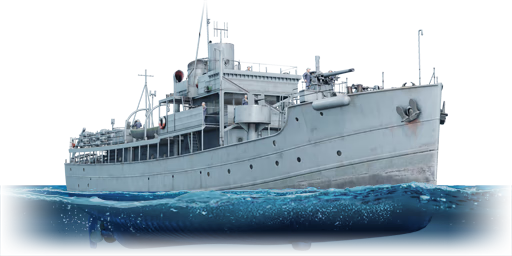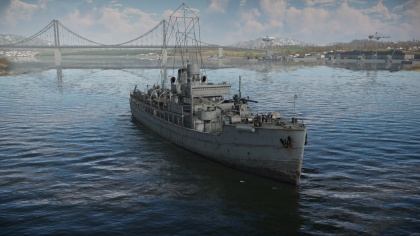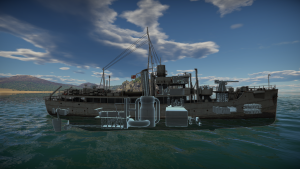HMS Liscomb
Contents
Description
The Isles-class, HMS Liscomb (T-285) is a rank British sub-chaser
with a battle rating of (AB), (RB), and (SB). It was introduced in Update 1.83 "Masters of the Sea" as part of the British fleet Closed Beta Test.
General info
Survivability and armour
Isles class (T-285) has the following armour layout:
- 20 mm/70 Oerlikon Mk.II) gunshields: 12.7 mm, hardened armour
- Hull: 6 mm, steel
- Superstructure: 4 mm, steel
Any gun in the game is able to penetrate anywhere on the boat, including the gunshields, at practically any range.
There is currently no gun in the game that can hull-break Isles class (T-285).
Isles class (T-285)'s hull is split into four compartments. The first compartment starts at the bow and ends where the raised forecastle ends, just in front of the forward 4 in QF Mark V cannon. The second starts the end of the forecastle and ends in front of the bridge. The third starts at the bridge and ends in front of the aft 20 mm/70 Oerlikon Mk.II mount. The fourth starts at the aft gun mount and ends at the stern. Isles class (T-285) is notable for being one of the only rank I boats to have the "Shrapnel Protection" modification, though this doesn't affect survivability much. With a crew complement of 40, overall survivability is high.
Isles class (T-285) has two types of ammo racks: one ammunition storage and one shells room. The ammunition storage is located below the forward 4 in QF Mark V cannon; it is never emptied. The shells room is split into two locations (though damaging one will also damage the other): one below the ammunition storage and one in the bow, both above the waterline; it is emptied when there is only one round of ammunition remaining for the forward 4 in QF Mark V cannon. Destroying either the ammunition storage or the shells room does not destroy the boat.
Mobility
While the T-285 is a large, heavy ship, it maintains a forward max speed can reach up to 24.7 km/h (or 32 km/h with the appropriate upgrades). However, these did little to improve the T-285's manoeuvrability.
Armament
Primary armament
The main armament is the 4 inch QF Mark V cannon with a maximum of 150 rounds stocked on board. With a choice of high-explosive, semi-armour piercing and fragmentation rounds. With a muzzle velocity of 805 m/s, hitting targets up to 4 km shouldn't be too difficult although the gun is prone to the occasional inaccurate shot. Generally speaking the high explosive rounds will be enough to tackle any target the T-285 will encounter and while you might encounter destroyers where the semi-armour piercing rounds would be better suited to the task, the opportunity to do so is unlikely given the number of shots it would probably require to sink them let alone survive long enough from counter-fire or aerial bombardment to do so. Fragmentation rounds can be rather potent as well but given the nature of their timed explosive they can be rather inconsistent but with enough practice and skill, it is possible to use this to your advantage, even in knocking out any low flying aircraft if you're good enough.
Secondary armament
Auxiliary armaments consist of three 20 mm Oerlikon Mk. II cannons with two sitting behind the Mark V cannon and the third sitting on the aft. Ammunition belts are the Universal (HEF-T · HEF-I · AP-T), High Explosive (HEF-T · HEF-I · AP-T · HEF-I) and Armour Piercing (AP-T · AP-T · AP-T · HEF-I). These guns provide good anti-air support but can also be used to against any smaller, faster ships within 2 km or less regardless of ammunition used.
Anti-aircraft armament
Flanking the bridge is a pair of dual-mounted 7.72 mm Lewis machine guns that are technically designated as the ships anti-air guns but given their small calibre and somewhat awkward angle they shouldn't be relied upon.
Special armament
Finally, the T-285 can also deploy the Mk. VII depth charge behind it with a rather high capacity of 20 charges. But considering the ship's slow speed and poor mobility the chances of getting close enough to enemy ships to use them is very rare and therefore it's not recommended to carry them as they are an explosive liability when exposed to enemy gunfire.
Usage in battles
Despite being classified as a sub-chaser, the T-285 acts more like a heavy gun platform with its varied and effective weaponry on a slow-moving ship. Because of its large size and poor mobility, it's not particularly suited to the frontlines and tight spaces. Instead, captains of the ship should provide covering fire for allies from a distance. This is to make yourself a smaller target against ships and give a higher chance to avoid torpedoes as well as the fact the Mark V cannon has good muzzle velocity for attacking distant targets while reducing counter-fire
The Oerlikon guns should concentrate on providing anti-air support as bombers often find the T-285 to be a rather attractive target due to its size but you should also be aware of any enemy motor torpedo boats attempting to deploy their torpedoes on you which is where the Oerlikon guns can be used to counter them, particularly if they are within 1 km or less to you as the Mark V cannon may not have enough time to react to them. One final note about the two Oerlikon guns behind the Mark V cannon is that they have limited negative vertical traverse when pointed towards the bow. As such, when attempting to aim at any close proximity targets in front of you, you will need to turn the ship left or right from the target to give the guns enough depression to aim down at them.
Pros and cons
Pros:
- Well-armed ship that can tackle most targets
- Mark V cannon possesses high-velocity ammunition
- Powerful 20 mm secondary armament can be used for both anti-air and anti-ship purposes
Cons:
- Slow and difficult to navigate
- Large profile and size makes it an easy target
- Prone to catching fire
- Useless at close range fighting
- 7.72 mm machine guns are ineffective against most air targets at its battle rating
History
Describe the history of the creation and combat usage of the ship in more detail than in the introduction. If the historical reference turns out to be too long, take it to a separate article, taking a link to the article about the ship and adding a block "/History" (example: https://wiki.warthunder.com/(Ship-name)/History) and add a link to it here using the main template. Be sure to reference text and sources by using <ref></ref>, as well as adding them at the end of the article with <references />. This section may also include the ship's dev blog entry (if applicable) and the in-game encyclopedia description (under === In-game description ===, also if applicable).
Media
Excellent additions to the article would be video guides, screenshots from the game, and photos.
See also
Links to articles on the War Thunder Wiki that you think will be useful for the reader, for example:
- reference to the series of the ship;
- links to approximate analogues of other nations and research trees.
External links
Paste links to sources and external resources, such as:
- topic on the official game forum;
- encyclopedia page on the ship;
- other literature.
| Britain sub-chasers | |
|---|---|






